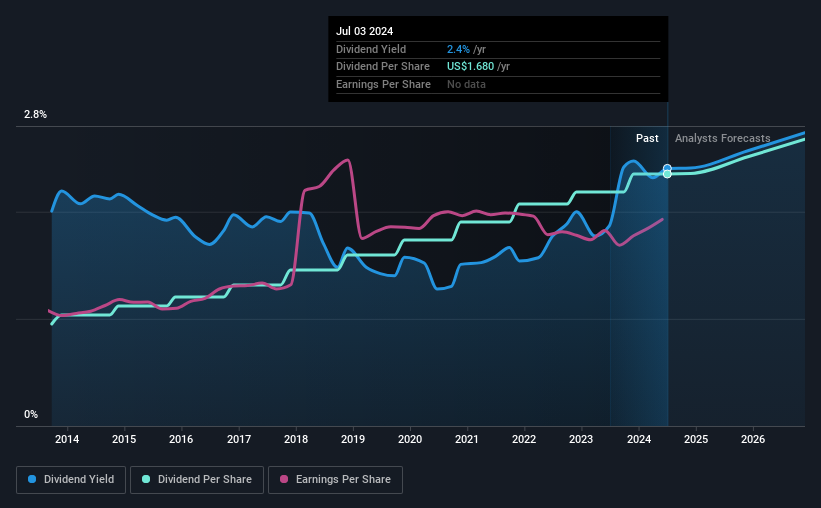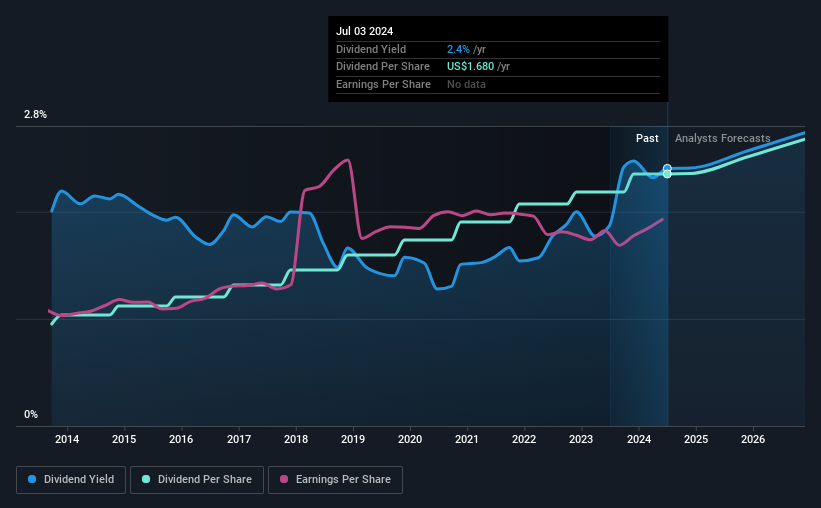Some investors rely on dividends for growing their wealth, and if you’re one of those dividend sleuths, you might be intrigued to know that McCormick & Company, Incorporated (NYSE:MKC) is about to go ex-dividend in just three days. The ex-dividend date occurs one day before the record date which is the day on which shareholders need to be on the company’s books in order to receive a dividend. The ex-dividend date is of consequence because whenever a stock is bought or sold, the trade takes at least two business day to settle. Therefore, if you purchase McCormick’s shares on or after the 8th of July, you won’t be eligible to receive the dividend, when it is paid on the 22nd of July.
The company’s next dividend payment will be US$0.42 per share, on the back of last year when the company paid a total of US$1.68 to shareholders. Calculating the last year’s worth of payments shows that McCormick has a trailing yield of 2.4% on the current share price of US$69.87. If you buy this business for its dividend, you should have an idea of whether McCormick’s dividend is reliable and sustainable. So we need to check whether the dividend payments are covered, and if earnings are growing.
See our latest analysis for McCormick
Dividends are typically paid from company earnings. If a company pays more in dividends than it earned in profit, then the dividend could be unsustainable. McCormick is paying out an acceptable 59% of its profit, a common payout level among most companies. Yet cash flow is typically more important than profit for assessing dividend sustainability, so we should always check if the company generated enough cash to afford its dividend. Over the last year it paid out 50% of its free cash flow as dividends, within the usual range for most companies.
It’s positive to see that McCormick’s dividend is covered by both profits and cash flow, since this is generally a sign that the dividend is sustainable, and a lower payout ratio usually suggests a greater margin of safety before the dividend gets cut.
Click here to see the company’s payout ratio, plus analyst estimates of its future dividends.
Have Earnings And Dividends Been Growing?
When earnings decline, dividend companies become much harder to analyse and own safely. If earnings fall far enough, the company could be forced to cut its dividend. That’s why it’s not ideal to see McCormick’s earnings per share have been shrinking at 4.9% a year over the previous five years.
The main way most investors will assess a company’s dividend prospects is by checking the historical rate of dividend growth. In the last 10 years, McCormick has lifted its dividend by approximately 9.5% a year on average. That’s interesting, but the combination of a growing dividend despite declining earnings can typically only be achieved by paying out more of the company’s profits. This can be valuable for shareholders, but it can’t go on forever.
The Bottom Line
From a dividend perspective, should investors buy or avoid McCormick? It’s never good to see earnings per share shrinking, but at least the dividend payout ratios appear reasonable. We’re aware though that if earnings continue to decline, the dividend could be at risk. With the way things are shaping up from a dividend perspective, we’d be inclined to steer clear of McCormick.
With that being said, if you’re still considering McCormick as an investment, you’ll find it beneficial to know what risks this stock is facing. Our analysis shows 1 warning sign for McCormick and you should be aware of it before buying any shares.
Generally, we wouldn’t recommend just buying the first dividend stock you see. Here’s a curated list of interesting stocks that are strong dividend payers.
Have feedback on this article? Concerned about the content? Get in touch with us directly. Alternatively, email editorial-team (at) simplywallst.com.
This article by Simply Wall St is general in nature. We provide commentary based on historical data and analyst forecasts only using an unbiased methodology and our articles are not intended to be financial advice. It does not constitute a recommendation to buy or sell any stock, and does not take account of your objectives, or your financial situation. We aim to bring you long-term focused analysis driven by fundamental data. Note that our analysis may not factor in the latest price-sensitive company announcements or qualitative material. Simply Wall St has no position in any stocks mentioned.
Have feedback on this article? Concerned about the content? Get in touch with us directly. Alternatively, email editorial-team@simplywallst.com
EMEA Tribune is not involved in this news article, it is taken from our partners and or from the News Agencies. Copyright and Credit go to the News Agencies, email news@emeatribune.com Follow our WhatsApp verified Channel






